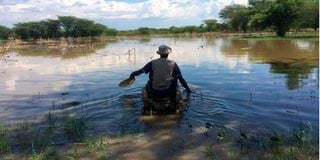Premium
Farmers in Baringo rue heavy losses as climate crisis takes toll

Kevin Lekoseki navigates through his flooded farm at the Perkerra Irrigation Scheme in Marigat, Baringo County, on a boat-like structure.
A month ago, Mr Obadia Kipruto, a rice farmer at the Perkerra Irrigation Scheme in Baringo South Sub-county took a Sh500,000 loan to plant rice on his 10-acre farm, optimistic of a bumper harvest.
Three weeks after tilling and planting, the main water intake pump was badly damaged by raging flood waters after heavy rainfall, cutting water supply to thousands of acres of farmland.
Mr Kipruto is now in a panic, wondering how he will salvage his crops and repay the loan.
“The crop is now three weeks old and needs more water, but the supply has been cut,” said Mr Kipruto, who was looking forward to harvesting at least two tonnes of rice per acre, translating to over Sh2 million from the farm.
“If the water intake is not repaired soon, the entire crop will be destroyed,” the distressed farmer told Nation.
This is the case for thousands of other farmers in Perkerra who have planted various crops such as tomatoes, onions, green grams, and watermelon.
Irrigation scheme
“We are appealing to the government to repair the machines because they are old and have never been replaced since the colonial times, yet this irrigation scheme is the region’s breadbasket,” Mr Kipruto said. Another farmer, Ms Maureen Muge, is also grappling with the same challenge.
She spent more than Sh60,000 to plant two acres of green grams after securing a contract with Simlaw Seed Company Ltd.
“I am worried because I spent all the money I had to cultivate the green grams, expecting to reap more than Sh120,000. I depend on this farm for a living, including paying school fees for my children,” said Ms Muge, who further revealed that more than 400 acres of farmland is under green gram production at the scheme.
Perkerra Irrigation Scheme Manager Daniel Waweru told Nation that plans are underway to undertake emergency repairs. He said he was waiting for the flood waters to subside to organise for the repair of the intake and rebuilding of slab that was washed away.
Climate change has been the bane of farmers at the irrigation scheme for years now, with their crops often swept away by flood waters during rainy seasons and rivers drying up during dry spells. The more than 5,800-acre scheme has been a lifeline to thousands of people who directly depended on it for a living, with more than Sh100 million generated annually.
Since its inception in 1956, the scheme has depended on River Perkerra as its main source of water, a situation that has hampered activities at the farm because it cannot sustain production during dry spells, forcing farmers to reduce the acreage thus affecting their harvests.
The government had promised to construct a multibillion-shilling mega dam in Radad in the same constituency to alleviate the perennial water challenges, but the project is yet to kick off. Last year, the drying up of River Perkerra affected thousands of farmers at the scheme, with the worst hit being those depending on seed maize farming. In 2020, flood waters washed away more than 800 acres of maize after Lake Baringo burst its banks.
Among the affected irrigation schemes were Perkerra, Murda, Nenteyo, Lebunyaki, Lorrok, Sandai, Mosuro, Eldume, Kamosok, and Sukutek. At the Perkerra Irrigation Scheme, more than 165 acres of seed maize were washed away.
Financial constraints
According to the National Irrigation Authority (NIA), the construction of the scheme started in 1954 after several feasibility studies, which showed that the Perkerra plains were suitable for irrigation. The last study was done in 1936 but, due to financial constraints, construction was shelved until the State of Emergency period, when Mau Mau detainees provided free labour for construction purposes.
Marigat was one of the many detention camps at the time.
The beneficiary population comprising direct dependants is approximately 13,000 people. It also indirectly benefits residents in parts of Nakuru Counties. Among all the towns in Baringo County, Marigat is the leading generator of revenue, netting about Sh54 million annually mainly from the irrigation schemes.
In 1996, farmers under the scheme started planting seed maize under contract with the Kenya Seed Company. Certified maize seed production became a turning point for locals. Assured markets as well as better and prompt payment improved the livelihoods of local farmers.
All this is now under threat with the vagaries of climate change occasioning heavy losses.





